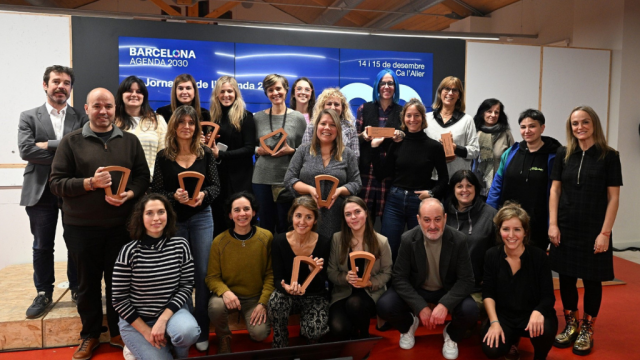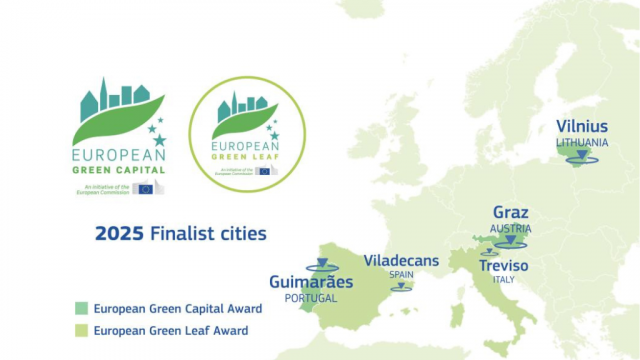The City Council organised last 25th October at the Cúbic building the conference "The potential of medium-sized cities, key to the 2030 horizon", with the support of the Diputació de Barcelona. Around 150 people - technicians and councillors from several city councils and representatives of companies and organisations from Viladecans - attended the event, which allowed them to study strategies, opportunities and success stories for approaching the future with a medium-sized city perspective. The attendees highlighted the role of Viladecans as a reference at national and European level when it comes to implementing innovation policies that rethink the present to think about the city of the future. Working collaboratively to meet the challenges facing cities in 2030 was the other point on which everyone agreed.
The Deputy Mayor for Ecological Sustainability, Employment and Economy, Richard Calle, and the Diputació de Barcelona international relations technician Mireia Sanabria, opened the event. Calle stressed the political will that Viladecans has always had to work on a local and at the same time global strategy that has to result in a more sustainable society that prioritises people's well-being. He also stressed that without joy, motivation and the desire to generate impact, it would be impossible to move towards the Viladecans of 2030. Mireia Sanabria focused her speech on the role of medium-sized cities and how a global project such as the 2030 Agenda has to be materialised in local public policies through networking and international presence to achieve subsidies, strength and visibility.
The contents of the conference were articulated around three itineraries: Medium-sized Cities and Agenda 2030, Medium-sized Cities and Urban Agenda and Futures Studies, a useful tool for the planning of cities. These itineraries began with a round table on each topic, followed by workshops to assimilate and practice the concepts explained. The aim was to create spaces for reflection to contribute ideas on how to improve society in all areas by focusing on sustainable growth. Mayor Carles Ruiz, who was present throughout the day in the different spaces, wanted to emphasize that since Viladecans was chosen by the Ministry of Transport, Mobility and Urban Agenda to be a pilot city demonstrating what could be done in terms of Urban Agenda, the City Council has increased the volume of projects aimed at improving the city. He also highlighted other important recognitions, recalling that "we have just been selected to coordinate the State Network of Educating Cities throughout Spain and we have been given the European Green Leaf award to be European capital of medium-sized cities in 2025. Therefore, we have a very important responsibility and the challenge to be leaders in these policies. We have these recognitions because we are working on a problem that concerns us a lot, which is how to make cities better so that they can better withstand the uncertainties of the future".
The first itinerary addressed the added value of the 2030 Agenda in medium-sized cities and how to get municipal teams to adopt it as part of their daily work. The round table was moderated by Ana Tapia, head of the Agenda 2030 and SDG Unit of the Diputació de Barcelona and brought together Ana Moreno, CEO of Oncities 2030 and Urban Journalism Institute, Toni Merino, manager of Mataró City Council and Alicia Valle, manager of Viladecans City Council. Valle explained that Viladecans has six strategic axes, placing special emphasis on economic dynamization and educational and inclusion policies. She stressed that inclusion, greenery and a gender perspective are the key elements of any city project. The attendees of this itinerary then took part in a workshop where they divided into groups to reflect on which Sustainable Development Goals (SDGs) are most important for cities and which ones are most important at a global level. In order to achieve them, they concluded that the renewal of the administration is necessary. They also discussed which are easier and more difficult to communicate and implement.
The contents of the table on medium-sized cities and the Urban Agenda focused on the essential ingredients that a local urban agenda in a medium-sized city must have, which, according to Sonia Hernández, deputy director of Urban Policies of the Ministry of Transport, Mobility and Urban Agenda, they have to go through leadership, citizen participation and governance that gives continuity to the issue. This round table, moderated by Pilar Cervantes, head of Urban Improvement of the Urban Planning Service of the Diputació de Barcelona, also included Landa Hernández, communicator and disseminator at Paisaje Transversal; Richard Calle, Deputy Mayor for Ecological Sustainability, Employment and Economy, and Martí Pujadas Ferrer, Councillor for Strategic Planning of the Granollers City Council.
Viladecans and Granollers explained how they are working on their Urban Agenda. Calle spoke about the MIA (City Hall Innovation Model) and the Viladecans Future Office, as key elements of the City Council in terms of innovation to face the future of the city. In this sense, Jon Aguirre, founding partner of the Paisaje Transversal comprehensive urban planning office, highlighted that Viladecans has three decisive factors that project it into the future: “a very powerful leadership that is open to new ideas, a network of institutional entrepreneurs that they promote innovation and the capacity for adaptability, since every four years the mandate is renewed and what has been built is placed in crisis and progress is also made on this.” Those attending this itinerary participated in a workshop where they reflected and ended up choosing ten mantras that will help them apply the urban agenda to their reality and daily tasks. Some of these mantras were “if you don't measure it, you will never know what you get”, “if you let the green grow, you will gain well-being” or “2030 starts today”.
In the third itinerary, the members of the round table pointed out several topics, such as what people need from their cities, what problems current public spaces present and what are the main challenges to be addressed. They were Berta Segura, trend analyst and innovation expert at D-Mentes, Enric Serra, director of the Territorial Planning Area at the Viladecans City Council and Marina Jarque, director of the City Future Office – Viladecans 2030. Francesca Tur, CEO from Tendencias TV, was the moderator. Tur congratulated the City Council for the day and for the work being done in the city. "It is a very pioneering city with a very contemporary mentality that is very difficult to find, the concept of sharing collective intelligence is very modern and difficult to carry out and this day is an example that this works." Mayor Carles Ruiz intervened at one point in the round table, when asked about how he decided to bet and work on a city strategy that looks to the future "we knew where we wanted to go and where to ask for help and we formed a good team to support this strategy, because the mentality has to change. Weaving networks has also given us knowledge and resources.”
The practical part was a sharing where all the participants concluded that the urban planning of the future has to go through common sense, decreasing and growing again consciously from regeneration and thinking about health, well-being and inclusion of all people.
The day ended with a conversation between Mayor Carles Ruiz and Sara Cerezo, Silvia Espín and Julio Lucena, young members of the Viladecans future office. In this closing, the conclusions of the entire day were addressed, placing special relevance on the collaborative work of administrations, companies and civil society to jointly achieve the objectives for 2030.



